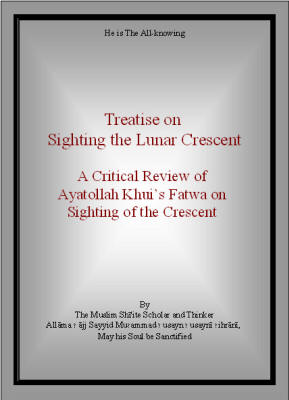
Sighting the crescent in a region is valid only for the regions adjacent to (or East of) that region.
Subject of the Book : A Critical Review of Ayatollah Khū’ī’s (May his soul be sanctified) Fatwā on Sighting of the Crescent
■ Is sighting of crescent in any part of the world valid for the whole world?
■ Why are the astronomical calculations not legally grounded?
■ What is the most normal way to realize the birth of new moon?
■ What regions have common horizons?
It is a collection of the correspondence between Allama Ayatollah Tihrānī, may God sanctify his soul, and one of his Usūl masters, i.e., the late Ayatollah Sayyid Abu’l Qāsim al-Khū’ī, may God submerge him in His Mercy, concerning the necessity of common horizons in the sighting of hilāl for attesting to the beginning of Lunar months.
This volume consists of scientific, legal, technical, and analytic-encyclopedic discussions contained in five letters in Arabic by both authors.
Excerpts from the book:
• Fifteen astronomical discussions concerning movements of the sun, the earth, and the moon and their interrelationship.
• Paying attention to difference of horizon and its impact on human life is evident.
• The criterion for the beginning of a new month is moon’s exit from the lower rays of the sun.
• All the tribes and nations that practiced the Lunar calendar have marked the sighting of the crescent as a criterion for the beginning of a new month, whose time is different in different horizons.
• If sighting the new moon in one spot of the world is taken as proving the beginning of a new month for all, so also the occurring of eclipse in any part of the world must necessitate performing “āyāt prayer” for all people of the world!
• Legal rulings based on conventions are applicable for all people, rather than requiring accurate specialized calculations.
• Accepting the master’s fatwā (legal judgment) necessitates belief in flatness of the earth.
• Provision of “ru‘ya” (sighting) in traditions is thematic rather than instrumental.
• Laylat al-Qadr is not a similar time all around the world; rather, in every region it starts at early evening and continues till morning in that very region.
Arabic full text